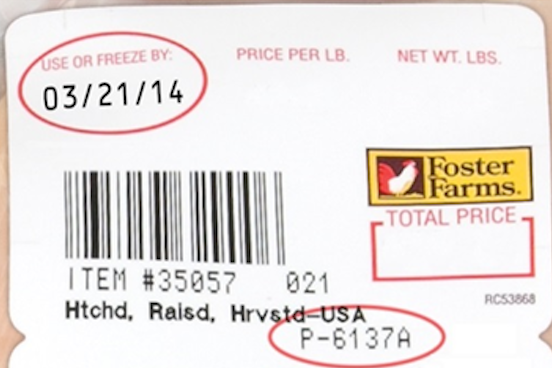Foster Farms Recalls Chicken After USDA Inspectors Finally Link It To Salmonella Case
The recall covers just three days of production and was only issued after a 10-year-old in California was hospitalized in early May after eating Foster Farms boneless chicken breast in late April, LA Weekly reports.
The chicken in question was produced by the company in March and is thought to be contaminated with a particular strain of Salmonella Heidelberg.
According to the USDA Food Safety and Inspection Service, the illness is part of an ongoing outbreak, which has sickened more than 600 people and is currently being monitored by U.S. regulators.
The outbreak, which began nearly 16 months ago, resulted in only one other recall last year from Costco when the company pulled cooked Foster Farms rotisserie chicken.
While the new, limited recall may get some infected chicken off the shelves, it doesn’t go nearly far enough consumer advocates say.
Dr. Urvashi Rangan, executive director of Consumer Reports Food Safety and Sustainability Center says in a statement [PDF] that the company and government need to widen the dates related to the recall shut down the plants in question until the outbreak is under control.
“We think it’s outrageous that despite the fact that 621 confirmed human illnesses and hospitalizations have been tied to the same virulent and drug resistant strains of Salmonellae found in Foster Farms chicken over the last 18 months, that the recall is only being restricted to three days in March 2014 and tied to only one human illness,” Rangan says. “Consumers deserve better.”
Rules that govern the way in which regulators can issue recalls is just one reason a wider-reaching recall hasn’t been issued in this case.
Prior to the sick California child there had been no direct evidence that linked the illnesses associated with the outbreak to a specific product or production lot.
Evidence that is required for a recall includes obtaining case-patient product that tests positive for the same particular strain of Salmonella that caused the illness, packaging on product that clearly links the product to a specific facility and a specific production date, and records documenting the shipment and distribution of the product from purchase point of the case-patient to the originating facility.
Those constraints could be a thing of the past. A new law introduced in the House last month aims to clarify what constitutes “adulterated” meat, thus giving the USDA the legal standing it needs to issue much-needed recalls.
However, despite the lack of evidence, the Centers for Disease Control found in January that Foster Farms was likely responsible for an antibiotic resistant strain of salmonella first reported in October 2013. Still no recall was issued at the time.
The recalled products include fresh chicken products sold by retailers under Foster Farms or private label brand names, with varying “use or freeze by”dates ranging from March 16 through March 31, 2014, and frozen Sunland Chicken products with “best by” dates from March 7 through March 11, 2015.
A full list [PDF] of recalled products can be found on the USDA website.
Products were shipped to Costco, Foodmaxx, Kroger, Safeway and other retail stores and distribution centers in Alaska, Arizona, California, Hawaii, Idaho, Kansas, Nevada, Oklahoma, Oregon, Utah and Washington.
Earlier this year, Foster Farms drew the ire of inspectors and consumer advocacy groups when one of its California plants was shut down for a cockroach infestation. While the cockroaches weren’t linked to the ongoing outbreak, they can carry bacteria, including salmonella.
Just two days after reopening the plant, Foster Farms voluntarily shut it back down in order to “expand its USDA-approved safe manufacturing procedures and monitoring systems.”
Foster Farms Finally Recalls Chicken. Sort Of [LA Weekly]
Want more consumer news? Visit our parent organization, Consumer Reports, for the latest on scams, recalls, and other consumer issues.


